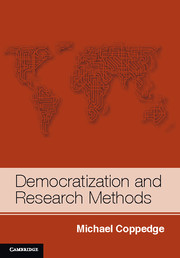Book contents
- Frontmatter
- Contents
- List of tables
- List of figures
- Acknowledgments
- 1 Research methods and democratization
- 2 Defining and measuring democracy
- 3 Criteria for evaluating causal theories
- 4 Checklists, frameworks, and Boolean analysis
- 5 Case studies and comparative history
- 6 Formal models and theories
- 7 Rigor in extensive and intensive testing
- 8 Political culture and survey research
- 9 Quantitative testing
- 10 An agenda for future research
- References
- Index
4 - Checklists, frameworks, and Boolean analysis
Published online by Cambridge University Press: 05 July 2012
- Frontmatter
- Contents
- List of tables
- List of figures
- Acknowledgments
- 1 Research methods and democratization
- 2 Defining and measuring democracy
- 3 Criteria for evaluating causal theories
- 4 Checklists, frameworks, and Boolean analysis
- 5 Case studies and comparative history
- 6 Formal models and theories
- 7 Rigor in extensive and intensive testing
- 8 Political culture and survey research
- 9 Quantitative testing
- 10 An agenda for future research
- References
- Index
Summary
On some level, we political scientists think we understand some things about the causes of democratization; we share a conventional wisdom. However, the conventional wisdom is fragmented and not well integrated: it consists of dozens of propositions about the conditions that favor democracy. Although there is a core of propositions that most scholars consider credible, this conventional wisdom is poorly integrated. Some propositions can be grouped into competing schools of thought but, as we consume, interpret, test, and cite the literature, we tend to consider each proposition in isolation, as though it could stand or fall on its own without affecting our belief in other propositions. What passes for the conventional wisdom is not, therefore, an integrated theory of interwoven propositions; the plural, conventional wisdoms would be more accurate. Our collective beliefs about democratization resemble checklists: lists of independent, unconnected items. Checklists are useful for reminding us about all of the varied factors that may be important. Unfortunately, just as a grocery list is not a short story, a checklist is not a coherent and integrated explanation.
There is no official screening committee that certifies that a proposition is generally true and rigorously supported before it joins one of the conventional wisdoms. Rather, our conventional wisdoms are just that: matters of convention. Whatever ideas many scholars have found convincing at one time or another come to be part of what we believe. Because different scholars are convinced by different things, conventional wisdoms are a hodgepodge of ideas originating from diverse sources. To be sure, some propositions have survived repeated testing in large samples using the most rigorous techniques in our toolkits. But many of them are the conclusions of less rigorous studies that were so convincing, in their way, that we have incautiously assumed the conclusions to be generally true. Many comparativists are impressed by intimate knowledge of the politics of a particular country or a region, so the conclusions of case studies and intraregional comparisons sometimes yield insights of a particularly solid kind, and we sometimes elevate these insights to the status of universal truth. Some ideas have been treated as received wisdom since the infancy of comparative politics, when the field was limited to comparisons of Britain, France, and Germany.
- Type
- Chapter
- Information
- Democratization and Research Methods , pp. 76 - 114Publisher: Cambridge University PressPrint publication year: 2012

